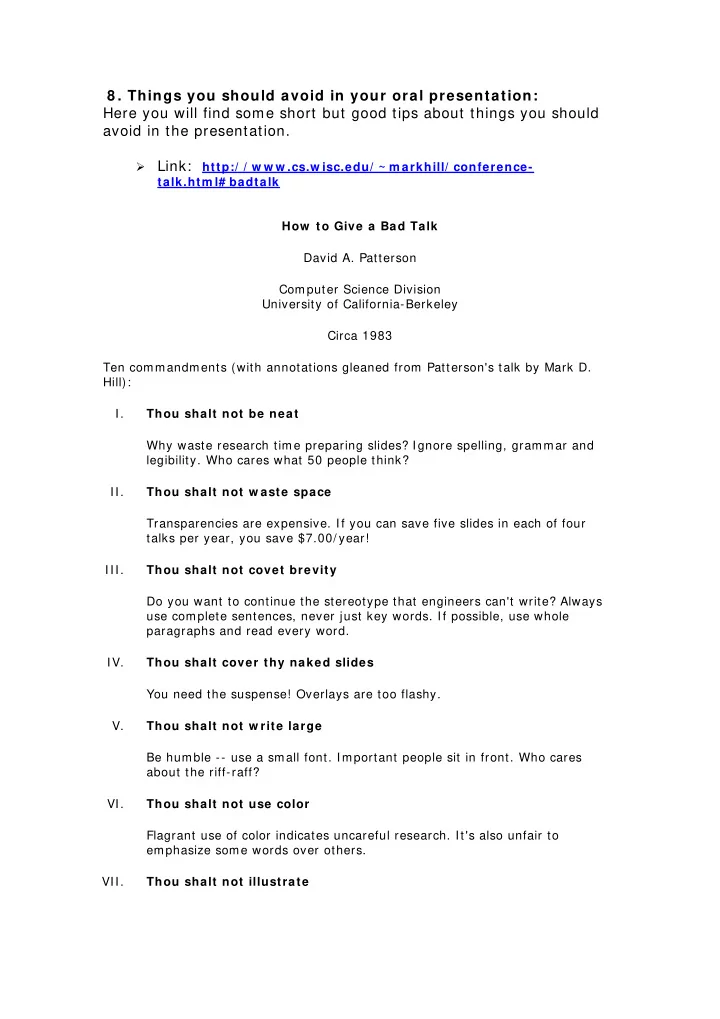

8 . Things you should avoid in your oral presentation: Here you will find some short but good tips about things you should avoid in the presentation. � Link: http:/ / w w w .cs.w isc.edu/ ~ m arkhill/ conference- talk.htm l# badtalk How to Give a Bad Talk David A. Patterson Computer Science Division University of California-Berkeley Circa 1983 Ten commandments (with annotations gleaned from Patterson's talk by Mark D. Hill): I. Thou shalt not be neat Why waste research time preparing slides? Ignore spelling, grammar and legibility. Who cares what 50 people think? II. Thou shalt not w aste space Transparencies are expensive. If you can save five slides in each of four talks per year, you save $7.00/ year! III. Thou shalt not covet brevity Do you want to continue the stereotype that engineers can't write? Always use complete sentences, never just key words. If possible, use whole paragraphs and read every word. IV. Thou shalt cover thy naked slides You need the suspense! Overlays are too flashy. V. Thou shalt not w rite large Be humble -- use a small font. Important people sit in front. Who cares about the riff-raff? VI. Thou shalt not use color Flagrant use of color indicates uncareful research. It's also unfair to emphasize some words over others. VII. Thou shalt not illustrate
Confucius says ` ` A picture = 10K words ,'' but Dijkstra says ` ` Pictures are for weak minds. '' Who are you going to believe? Wisdom from the ages or the person who first counted goto's? VIII. Thou shalt not m ake eye contact You should avert eyes to show respect. Blocking screen can also add mystery. IX. Thou shalt not skip slides in a long talk You prepared the slides; people came for your whole talk; so just talk faster. Skip your summary and conclusions if necessary. X. Thou shalt not practice Why waste research time practicing a talk? It could take several hours out of your two years of research. How can you appear spontaneous if you practice? If you do practice, argue with any suggestions you get and make sure your talk is longer than the time you have to present it. Commandment X is most important. Even if you break the other nine, this one can save you. � Link: University of Newcastle http: / / lorien.ncl.ac.uk/ ming/ dept/ tips/ present/ comms.htm Speak clearly. Don't shout or whisper - judge the acoustics of the room. Don't rush, or talk deliberately slowly. Be natural - although not conversational. Deliberately pause at key points - this has the effect of emphasising the importance of a particular point you are making. Avoid jokes - always disastrous unless you are a natural expert To make the presentation interesting, change your delivery, but not to obviously, eg: • speed • pitch of voice Use your hands to emphasise points but don't indulge in to much hand waving. People can, over time, develop irritating habits. Ask colleagues occasionally what they think of your style.
Look at the audience as much as possible, but don't fix on an individual - it can be intimidating. Pitch your presentation towards the back of the audience, especially in larger rooms. Don't face the display screen behind you and talk to it. Other annoying habits include: • Standing in a position where you obscure the screen. In fact, positively check for anyone in the audience who may be disadvantaged and try to accommodate them. • Muttering over a transparency on the OHP projector plate an not realising that you are blocking the projection of the image. It is preferable to point to the screen than the foil on the OHP (apart from the fact that you will probably dazzle yourself with the brightness of the projector) Avoid moving about too much. Pacing up and down can unnerve the audience, although some animation is desirable. Keep an eye on the audience's body language. Know when to stop and also when to cut out a piece of the presentation.
Recommend
More recommend